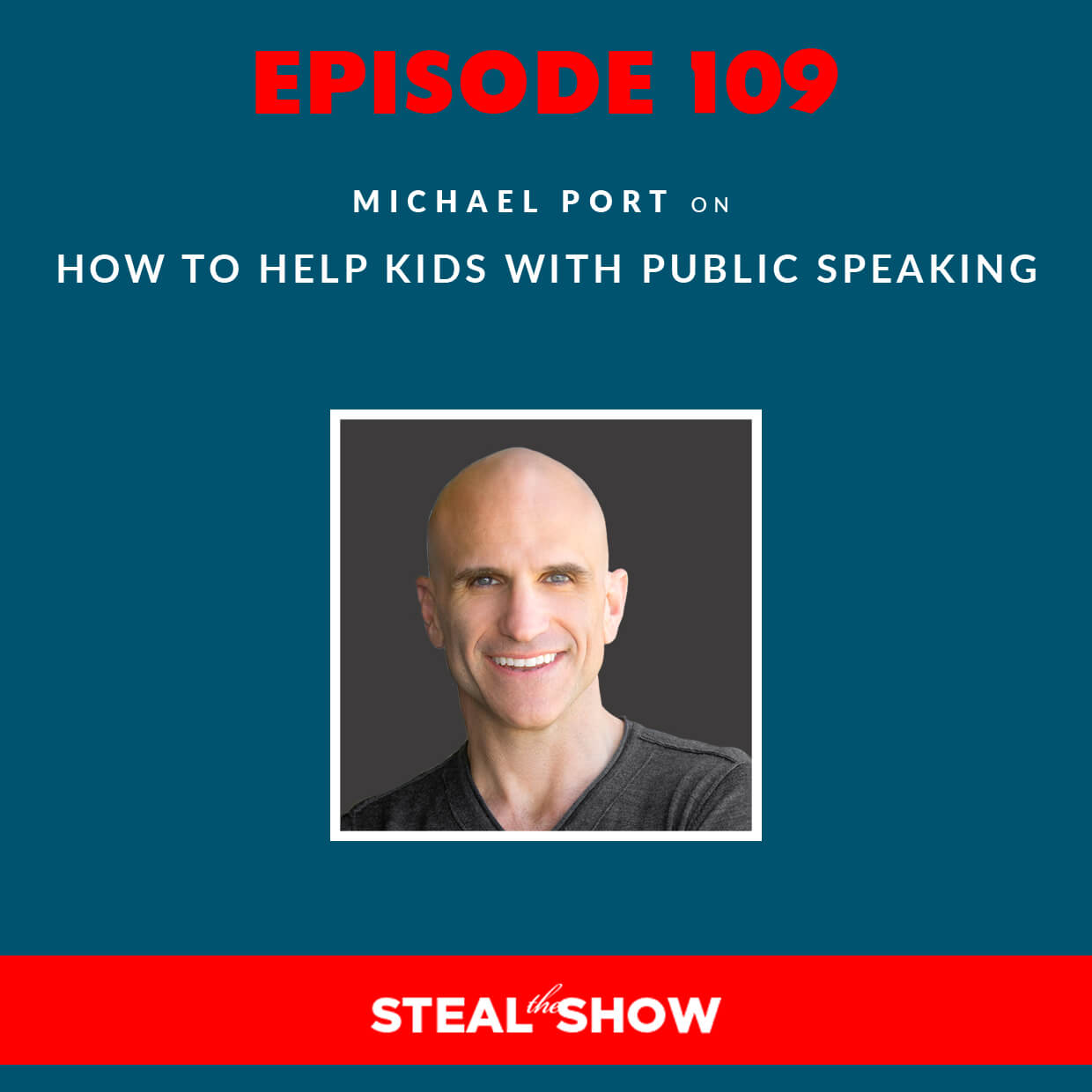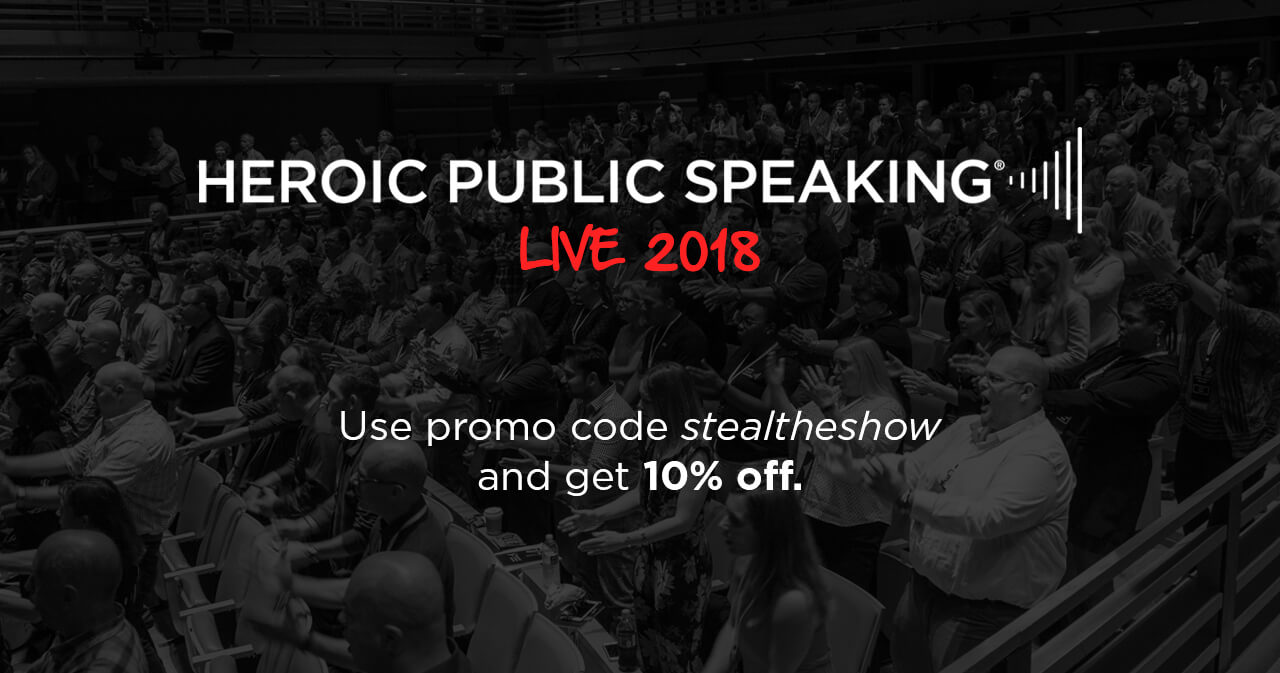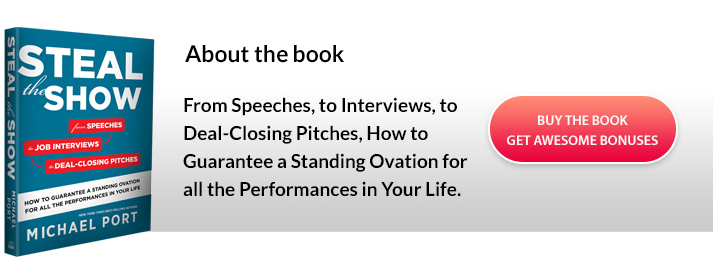00:00 Michael Port: So, looking at these weekly speeches as an opportunity for rehearsal was also something that was new to them, and that the easier time you have with public speaking as a kid, the easier time you’ll have as an adult, and, probably, you’ll make a lot more money.
00:20 Michael Port: Welcome to Steal The Show, with Michael Port. This is Michael.
I receive e-mails pretty much every day, asking for performance advice, and the one I’m about to read, really jumped out at me, and I have a feeling you might be in the same boat as this listener. So, bring your kids around and listen to this one, because it’s a family episode. Here’s the letter:
00:42 Paul (Listener): “Hi Michael, I hope you’re well. Just been listening to your ‘Steal The Show’ podcast, and really enjoying it. Started from the beginning again, for my kids to listen to, too. They do weekly speeches in school, two minutes max.
It would be nice if you had any extra pointers so they can ‘Steal The Show’ at school. They’ve been taught to start with a hook, then do introduction, main part and conclusion, but that’s all I got out of them. Looking forward to hearing from you.
By the way, I know you like boats. We’re lucky enough to live in Sydney, Australia, where I get to catch a ferry on Sydney harbour, to and from work, every day. Cheers! Paul.”
01:18 Michael Port: Paul! Thank you so much for the question. I took that ferry, so we have shared, maybe, the same seat. Wouldn’t that be incredible if we’ve actually sat on the same seat, on the same ferry, even though we live across the world from each other?
Maybe we were even on the ferry together, at the same time, Paul! It was a very, very beautiful, beautiful ride. So, Paul, here’s the deal: I like, I love, love, love that your kids are getting to do this in school, and I think that they are going to be so well prepared for the world that is waiting for them, when they graduate, because they’ll have better communication skills.
And I also appreciate the structure that their teacher is giving them. Something else that they can consider, is using the Heroic Public Speaking Foundational Five. Because there are five elements that exist in pretty much every speech.
And they’re not all delivered in the same order, necessarily. So, there are five foundational elements, and I’ll introduce them to you, but they don’t have to be delivered in order, necessarily, but they can. It’s a great structure for identifying the most important elements of your speech.
So, number one is: a big idea. A great speech has a big idea, and a big idea doesn’t necessarily need to be different to make a difference. It certainly can, and in some cases, in order for someone to say yes to something you’re pitching, yes, it does need to be different.
You know, if you are going in and you’re pitching for venture capital funds, well, then certainly I think they’re going to want your idea to somehow be different than the ideas they’ve heard all day. However, for most speeches, your idea doesn’t need to be different to make a difference, because there are many aspects of the world in which we live, that we know need to be changed, but we don’t know how to change; or we know how to change, but we’re not doing it.
So, for example, take Martin Luther King’s ‘I Have A Dream’ speech. What’s the big idea in that speech? Yes, all men and women are created equal. Was that a new idea? Was that a different idea? No, it was in the constitution, but it wasn’t actually realised in our country. In fact, it is still not actually realised.
So, it was a big idea for it’s time. And, in fact, I still think it’s a big idea! It’s one of the most important ideas that we, as a society, have, that all men and women are created equal. So, every speech has a big idea that is the foundation for the speech, as well as the through-line for the speech. It’s what the speech rests on.
So, when they’re giving the speech, your kids, what’s the big idea that supports the message in their speech? That’s number one.
Number two: What’s the promise that your speech is making, the promise to the audience? If you take Martin Luther King’s ‘I Have A Dream’ speech, well, if the big idea is that all men and women are created equal, the promise, yes, you know it, it even has the word in it, the promised land. “I promise,” is what Martin Luther King said, “that we will get to the promised land.” That’s his promise. Okay, pretty clear.
Now, here’s the thing: you have a big idea, and you have a promise, you need to be able to demonstrate to the audience that you understand the way the world looks to them. Because, even if they resonate with your big idea, even if they want what you have to offer, your promise, if they don’t think you get them, if they don’t think you understand them, their situation, their concerns, their desires, then it’s easier for them to say no.
Because your big idea may actually be confronting to them, even if they’re open to it, even if they’re excited about it, even if you’re not a confrontational person, your idea may provoke them. It may not be easy for them to adopt it.
And, even if they want to adopt it, because it may not be easy for them to adopt it, their natural inclination is to find ways to say no, and if they don’t think you understand them, specifically, uniquely, then it makes it easier for them to say no.
But if they believe that you understand the way the world looks to them, that you get them, and they resonate with your big idea, and they want what you have to offer, the promise of your speech, well, then they’re open to you.
So, that’s the third. The third foundational element is making sure that you know what the world looks like to the people you serve in the audience, and can articulate it. So they can say, “Yes! She gets me! Yes! He gets me!”
The fourth foundational item is being able to demonstrate the consequences of not adopting the big idea, not achieving, or experiencing the promise. Because consequences are the things that, often, people want to move away from. Consequences cause pain.
Sometimes psychological pain, sometimes emotional pain, sometimes physical pain. But discomfort is usually something people want to move away from. And so, that’s going to help them, it’s going to help inspire them, provoke them, encourage them, to take action.
And then, finally, the fifth element that exists in great speeches, is being able to demonstrate the rewards. The rewards that they will get, if the promise is realised. And, if you go back to Martin Luther King’s ‘I Have A Dream’ speech, that’s what he did throughout the speech. He said, “Look, right now, down in Selma, Alabama, there is a man being treated like this.”
So, he’s demonstrating, here’s the way the world actually looks, and in that description you get all the consequences, all the pain and suffering associated with not adopting and adhering to the big idea that all men and women are created equal. And then he says, “But we can get to the promised land!”
And then he describes the promise land. Those are all the rewards, the rewards that come from the promise, which, in his case, beautifully, was the promised land.
So, if your kids can use that structure, make sure they can articulate very, very concisely what the big idea is, they can articulate concisely what the promise is, they can articulate precisely the way the world looks to the people in the room, they can articulate concisely what the consequences are of not adopting the big idea. And they can concisely articulate, demonstrate, illustrate, the rewards of adopting the big idea, and achieving or realising the promise of the speech.
Paul, I hope the was helpful! I hope that was helpful. Oh, and, Paul, I actually gave a little workshop, a class to Jake’s sixth grade class – he’s now in the seventh – on presentations, because they all had to give a presentation on a project that they had completed.
So, when the teacher found out what I did, of course, she asked me to come in, and, of course, I couldn’t say no. And I was actually a little bit nervous, because I don’t speak to kids, and we hear horror stories about what it’s like to teach a group of kids. And so, I was a little bit nervous, but I went in and we were really pretty successful.
So, my big idea was that being a great public speaker actually makes you more popular. And that seemed to perk up their ears. I figured, well, what’s something that’s really important to middle schoolers at the moment. And then I focused on why people get nervous when they have to give a speech, because, of course, that is the condition that people experience very often, and so that is the way the world looks to them.
Then I pivoted into what being good at public speaking does for you, and how it makes you feel. So, I got deeper into the rewards, and then, I told them we were going to have some fun, at the expense of grown ups, by looking at all of the bad public speaking habits grown ups have and that the kids don’t have, because they’re still young.
They loved this idea. So, to do this, I placed index cards under their chairs, where I had taped big, coloured index cards, and each card had a few words on it, and each card was numbered. And we went through the cards one by one.
The kid with the card #1 stood up and read their words, and I talked to the concept. The student with the second card went next, and so on, so they were actively involved, and so excited that they all had a card, that it killed.
And, I’ll tell you what, Jake said that it was the first time in his entire school experience, that he’d ever seen all the kids in the class behave impeccably. Nobody said a word, nobody talked out of turn, nobody was inappropriate.
And I said, “Oh, I thought that’s just the way kids were in class, because that’s my experience when I went to your class.” And he said, “No, Dad! It doesn’t work that way!” And I thought, “Well, that’s pretty cool!”
So, looking at these weekly speeches as an opportunity for rehearsal was also something that was new to them, and that the easier time you have with public speaking as a kid, the easier time you’ll have as an adult, and, probably, you’ll make a lot more money.
12:40 Michael Port: Thank you for listening to Steal The Show with Michael Port. I’m your host, Michael Port.
This podcast was produced, by our director of communications, Laura Bernstein, with sound production and marketing by Kast Media. Music is mixed by Shammy Dee, and we recorded today’s episode at Heroic Public Speaking HQ, the most impressive public speaking facility in Lambertville, New Jersey and, probably, the world.
Special thanks to Paul, for writing in, and if you’d like your question featured, write to us at questions@heroicpublicspeaking.com. And thank you to you, for listening and learning how to be a performer in your spotlight moments.
Make sure to reach out to us on Instagram and Facebook, @heroicpublicspeaking, and leave us a review on iTunes and rate the show, if you’d like.
Oh, and make sure to visit heroicpublicspeaking.com/live to come to our big event October 1, 2 and 3, in Philadelphia, Pennsylvania. Enter the promo code, stealtheshow, all one word, all lower case, and you’ll get 10% off your ticket price.
Should have probably announced that at the beginning, because who knows if you’re still listening at the very end. But if you are, go get a ticket and take 10% off.
I love you, very much, but not in a weird way, I promise. Bye for now.








